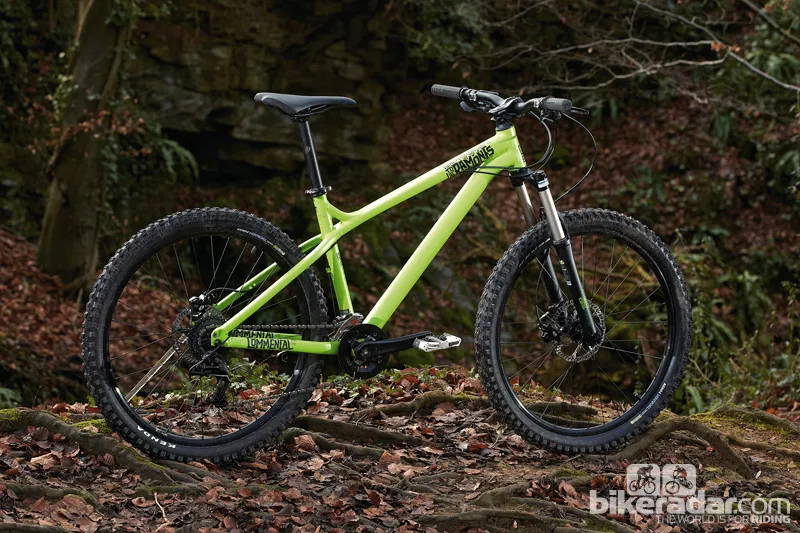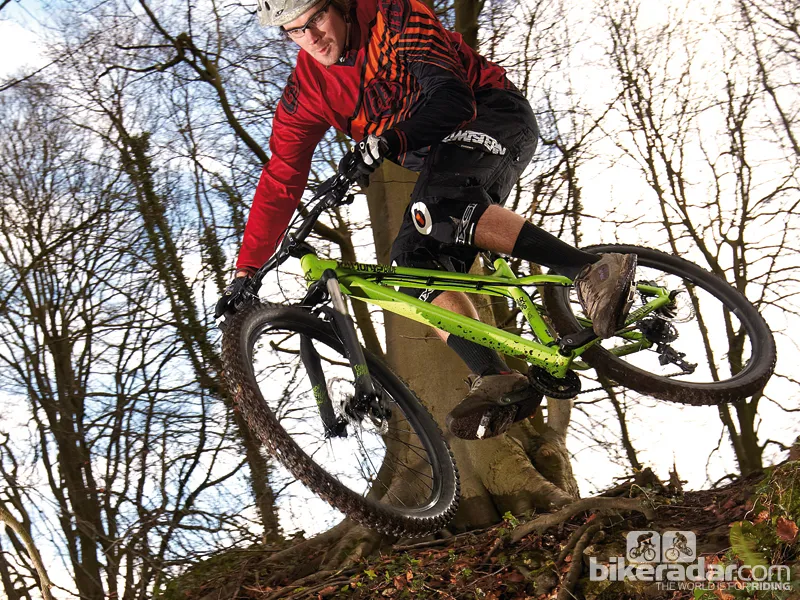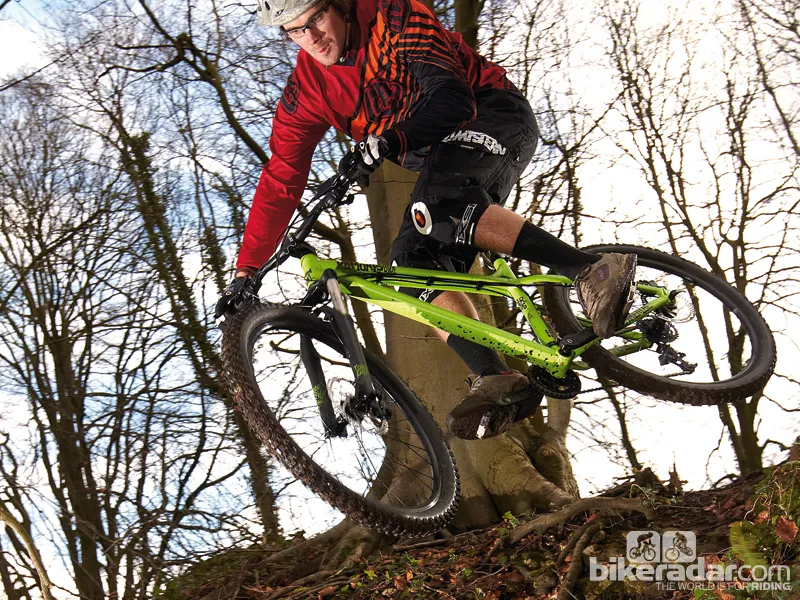Commencal have two bikes in their aluminium All Mountain HT range. They share a frame, but the more expensive AL1 has a 150mm (5.9in) travel fork. The AL2 tested here drops to 120mm (4.7in), but still has suitably relaxed angles and bags of attitude.
Ride & handling: Stiff and confident but with a harsh fork
First impressions of the Ramones are good. It feels immediately handy and poised, especially when standing, although we’d have expected slightly wider bars to complete the slack head angle/short stem setup. It’s not as laidback as its longer-travel brother, but it’s still slack by 120mm (4.7in) travel hardtail standards.
The layout of the bike makes you want to pop the front off pretty much everything and also makes it easy to do so. Unfortunately, riding like that exposes the weakness of the fork, which exhibits a top-out clunk every time the front wheel leaves the ground. It’s not the stiffest thing out there either. On a lesser frame it would be less noticeable, but the Commencal’s chassis is sufficiently stiff to throw a bit of fork twang into sharp relief.
Fundamentally, the Ramones offers great handling. There’s bags of grip, the geometry works really well and when you weight the front in corners the fork feels okay.
It gets bouncy at speed though, lacking any noticeable rebound damping. As it stands, the Commencal really likes slow, steep, nadgery stuff, but a fork upgrade would be the first thing on our list – even an entry level aftermarket model would make a huge difference.
If you’re massively into climbing you probably won’t be buying a bike like this anyway, but with a decent low gear, a stiff frame and grippy tyres it’ll winch up most things if you’ve got the legs for it. It is a heavy bike, but not offensively so given its intended use and price.

Frame & equipment: Low slung and great looking despite entry level transmission
While it doesn’t have any effect on performance at all, the first thing you’re likely to notice about the Ramones is its bright green paintjob. It’s a colour scheme that is likely to divide opinions, although for what it’s worth we quite like it. We like what’s underneath it too – a low-slung, compact frame that’s been built for some abuse.
The head tube is a conventional straight pipe rather than tapered, but that’s not at all surprising at the price. Both the main tubes are shaped. A flat-bottomed down tube uses almost all the available width of the bottom bracket shell for stiffness.
The top tube is a particularly radical shape – at first glance it’s a flattened rectangle, but the underside is actually concave, with the cables and rear brake hose tucked into the resulting hollow.
A curved strut helps to support the seat tube, with the top tube meeting the triangle-section seatstays that run down to dropouts that look chunky but are hollowed out at the back to save a bit of weight. The countersunk holes on the rear brake mount are a neat touch. The chainstays are slightly triangular too, broader at the bottom than on top. There are no bridges on the seat or chainstays, leaving plenty of mud room.
Given the intent of the Ramones, we were disappointed that there are no ISCG tabs on the bottom bracket shell – this is very much the sort of bike that you’re likely to want some sort of chainguide on at some point.
For this budget price, it’s no surprise to see a relatively lowly level of componentry. Up front is a 120mm (4.7in) travel coil-sprung RST Omega fork. It’s got a preload adjuster and a lockout lever, but that’s as far as adjustments go.
The wheels are Commencal-branded items that proved robust enough, shod with can’t-go-wrong 2.35in Kenda Nevegal tyres. Also bearing Commencal branding are the bar, impressively chunky stem and lock-on grips – a nice touch on a relatively inexpensive bike.
As with many other bikes at this kind of price, the Ramones comes with Tektro hydraulic disc brakes. They’re perfectly acceptable stoppers, with a 180mm front rotor helping things along. The transmission feels a little low-rent, especially the unbranded square-taper chainset.
You do get a useful 22/32/bashring combination though, which delivers a decently wide, if somewhat gappy, gear range when combined with the 8-speed 11-32T cassette at the back. Shifters and mechs are all from SRAM’s budget X4 range, which won’t excite but gets the job done.
This article was originally published in Mountain Biking UK magazine, available on Apple Newsstand and Zinio.

